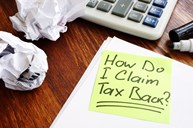Whether you're a carpenter, bricklayer, plumber, painter, plasterer, or tiler – you're an expert at your craft and understand the importance of hiring professionals for certain tasks. Your taxes deserve the same level of expertise.
Instead of spending hours each tax year struggling to navigate the complexities of tax returns, with uncertain success, consider turning to one of our experienced tax consultants here at H&R Block. They can efficiently assist you in completing your taxes accurately and promptly.
One of the primary advantages of seeking support during tax season is to ensure you maximise legitimate deductions specific to your industry. Overlooking these deductions means leaving your hard-earned money on the table. Our consultants possess comprehensive knowledge of the Australian tax system, ensuring you don't miss out on any eligible deductions.
To begin your tax return, you'll require an income statement from your employer (previously known as a "payment summary" or "group certificate"). This statement summarises your salary, wages, allowances, and bonuses for the financial year. You don't need to provide a physical copy of this statement, as it's typically lodged directly to the ATO by your employer. Once lodged, we can access this information and assist you in determining your deductions.
What should I keep in mind about claiming deductions?
As you're aware, you're entitled to claim deductions for expenses incurred during the financial year that directly contribute to earning an income. However, two key points to remember are:
- You must have personally spent the money (it cannot have been reimbursed by your employer), and
- You need to maintain a record of the expense, such as a receipt or invoice.
What deductions can I claim?
There is a wide range of deductions you can claim as a tradie, such as:
Tools and equipment
Chances are, you rely on a range of tools every day. The general rule is, if you've purchased them and they're essential for your job or business, you can claim them as a tax deduction.
However, the process varies depending on whether you're self-employed or work for someone else.
If you're running your own business, and have a turnover of less than $10 million, you may qualify for an immediate deduction for tools purchased and installed during the 2024, 2025 and (subject to the passage of the legislation) the 2026 years that cost less than $20,000.
For employees, the rules are less flexible. You can deduct tools costing $300 or less immediately. But if the cost exceeds $300, you'll need to depreciate it over the tool's lifespan, which could span several years. Be cautious with tool sets; you can't claim each tool separately unless the set costs less than $300. Otherwise, you'll need to spread the cost over several years.
The same principles extend to office equipment like computers, phones, printers, as well as mobile phones and tablets.
Remember to only claim the portion of the cost attributable to work or business use. If you also use the tools or equipment for personal purposes, you'll need to allocate the cost accordingly.
Vehicles
You can also deduct the expenses of running a vehicle, such as a car, van or a ute, used for business purposes or within your job, provided you personally paid for the vehicle (work-provided vehicles are not eligible for deductions).
The way you calculate your claim for vehicle expenses depends on what type of vehicle it is. If the vehicle is a passenger car (capable of carrying less than 9 passengers) or a ute with a payload of less than 1 tonne, whether you are an employee or own your own business, you can claim your work/business percentage of all your vehilcle expenses.
You will need to maintain a logbook detailing your work / business and private usage. Once you have established your claimable percentage you can deduct this percentage of all your vehicle expenses, such as repairs, registration, insurance, fuel, washing etc. You can also claim depreciation - which spreads the cost of the vehicle over its life. This claim is subject to the car limit - $69,674 for the 2025 year.
If the costs of the vehicle is less than $20,000, and your are a small businesses your can take advantage of the immediate writeoff and claim a deduction for your business percentage of the cost of the vehicle.
Alternatively, if your annual travel distance for work / business is less than 5000 km, and the vehicle is a passenger car or a ute meeting the payload criteria mentioned earlier, you can opt for a simplified approach: you can claim a set allowance of 88 cents per kilometre for 2024/25 year for every business kilometre traveled. This method has an allowance for all running costs of the vehicle. If you use this method, you cannot claim any other deductions for these individual expenses. If your annual distance travelled for work / business is more than 5,000 km, you can still use this method, but your are limited to claiming for 5000 km per vehicle.
If your vehicle is a ute with a payload of more than 1 tonne or a vehicle capable of carrying 9 or more passengers, you cannnot use the set rate method, but must keep receipts for all your expenses and a log book to establish the deductible amount. The depreciation limit does not apply to these vehicles.
Remember, you cannot claim expenses for commuting from home to work in your vehicle, unless your employer mandates transportation of heavy tools that cannot be stored at the workplace.
Work-related clothing
If your job requires you to wear either a mandatory uniform or protective gear for safety (or to safeguard your regular clothing underneath), chances are you're eligible for tax deductions on both the purchase and periodic cleaning costs.
Keep an eye out for commonly claimed items by tradespeople:
- Protective clothing and footwear designed to shield you from illness, injury, or damage to your regular clothes caused by your work environment. This type of clothing:
- Is tailored to withstand rigorous conditions where regular clothing falls short.
- Is explicitly designed for protection, such as heavy-duty shirts and trousers, distinct from standard workwear like cotton drill trousers and shorts that may not offer adequate protection.
- Offers UV protection for outdoor work.
Among the items you could claim are:
- Fire-resistant clothing
- High-visibility vests
- Steel-capped boots
- Gloves
- Safety glasses
- Hard hats
- Overalls
- Non-slip safety shoes
- Heavy-duty shirts and trousers, including rip-proof items made with durable mesh or featuring reflective strips
- Compulsory work uniforms branded with the employer's logo
- Sun protection items like sunglasses and sunscreen for outdoor work
Laundry and dry-cleaning
You can also claim expenses for washing, drying, ironing eligible work clothes, or having them dry-cleaned.
If your laundry expenses total $150 or less, written evidence isn't required for these expenses. Instead, the ATO allows you to use the following amounts to calculate your laundry claim:
- $1 per load, covering washing, drying, and ironing, if the load consists solely of work-related clothing
- 50 cents per load if other laundry items are included.
Obsolete Materials
If you're in business and have any obsolete, damaged, or unusable materials remaining on your site at the end of the fiscal year, it's advantageous to write off their cost before year-end to claim a tax deduction.
Additionally, if you have clients who are unable or unwilling to pay despite exhaustive efforts to recover the debt, write it off by June 30 to qualify for a bad debt deduction. Ensure you document the write-off through a Board Minute or similar record.
These actions not only help manage your financial records but also optimize your tax deductions.
Other possible claims
- Any transport expenses – including parking fees and tolls – if you are driving between multiple jobs or work locations during the day
- Award transport payments for deductible work-related travel
- Any expenses connected to buying, repairing and cleaning any work clothing items that are distinctive to your company (such as a shirt or shorts with a company logo on it) or that have protective benefits such as a hard hat, gloves, safety glasses or goggles, helmets or breathing masks as well as sunglasses or anti-glare glasses, sunhats and sunscreen
- The cost of insuring any personal tools or equipment to the extent that you use them for your work (which means if you also use the items outside of work then you can only claim a partial deduction)
- Self education costs for attending any courses, training or seminars specifically related to your current line of work, such as an apprenticeship
- Union and professional association fees
- Any renewal fees for licences, regulatory permits, certificates, or 'cards' related to your work – but not the initial cost of getting these items
- Any meals you buy and eat when you work overtime, but only if you get an overtime meal allowance under an industrial law, award or enterprise agreement and it's included in your assessable income
- Phone and internet expenses for any work-related usage on your personal phone or device, provided they are not already covered by your employer
- The cost of a first aid training course if you're a designated first aid person and need to do first aid training to assist in emergency work situations
- Working from home office or workshop expenses such as heating or cooling, and repairs to equipment
- Travel expenses such as accommodation and meals if you travel for work and need to stay away from home overnight and pay these expenses yourself
What can't I claim?
There are several key expenses you can't claim, including:
- Regular clothing of any kind, such as jeans, shorts, running shs or plain t-shirts, that can be worn outside of your workplace, even if you only ever wear these items when you're at work
- The cost of renewing your driver's licence, even if having it is a condition of your employment
- Any entertainment such as business meals, sporting events or concerts (even if you discuss business matters when you're there)
- Any fines for speeding or parking that are incurred during your work day
- Any tools or equipment provided to you by your employer
- The cost of any meals or snacks consumed during the course of a normal work day, even if you are given an allowance by your employer to cover the meal expense
What records do I need to keep?
Clear records are important at tax time, so you need to stay on top of your receipts and have a comprehensive set receipt if you want to get a good tax refund. It's a smart idea to create an easy and reliable system to help you keep on top of this throughout the year.
Remember, you don't need to keep physical receipts, and it's acceptable to keep a digital copy (such as a photo of a receipt or an email receipt) provided it is possible to read:
- The name of the supplier
- Amount of the expense
- Nature of the goods or services
- Date the expense was paid
- Date of the document
You also don't need to keep receipts for expenses under $10 (as long as these don't cumulatively come to more than $200). However, you will need to keep a diary record of these expenses.
What happens if I make a mistake in my tax return?
We know this can happen to anyone and strongly recommend dealing with it as soon as possible. It's essential that you take great care in putting together the information and supporting documentation when filing your tax return, and only claim deductions that are genuine to avoid penalties and possibly even prosecution from the ATO.
It's easy to make innocent mistakes sometimes, and if you self-lodge and realise you've submitted incorrect or unsubstantiated claims then you should contact H&R Block immediately and we will assist you in making the necessary amendments.
Still have some questions about lodging your tax return? Talk to H&R Block. Our experienced tax consultants will be able to help. Call 13 23 25 for details or find your nearest office and book an appointment online.
Please Note: This is general advice. To learn more about the possibilities of claiming a tax deduction, please contact your accountant.




.png?width=55&height=48&ext=.png)
-1.svg)

